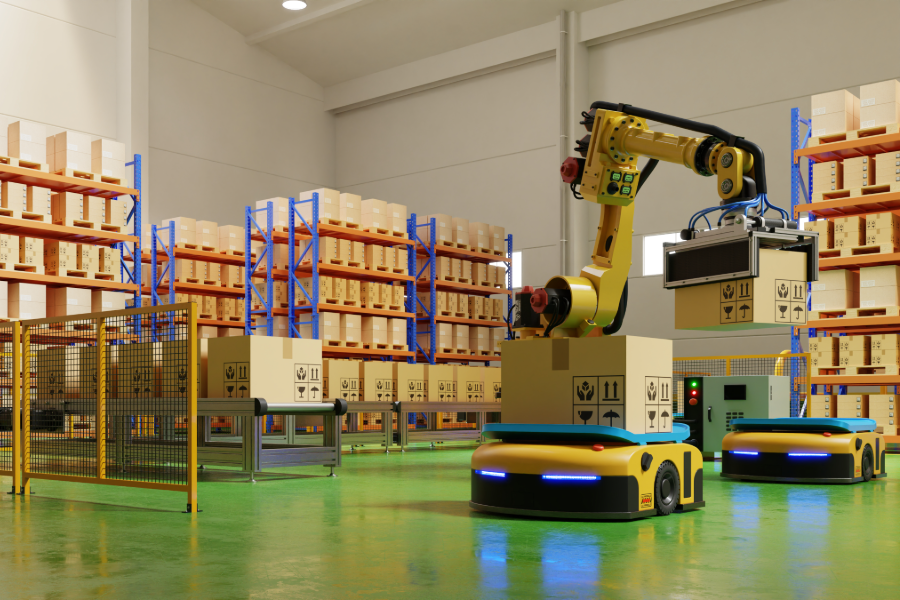Artificial Intelligence (AI) is far more than just a trend for the future — it is already transforming the way companies operate today. From automating everyday tasks to supporting strategic decision-making, AI helps streamline processes, reduce costs, and increase productivity. But what does this look like in practice? What real benefits does AI bring, what challenges do businesses face, and where is the technology headed?
How AI is Transforming Business Management
AI’s capabilities go far beyond simple automation. It can analyze vast amounts of data, identify patterns, and help companies make smart, well-informed decisions. But in which areas does AI really prove its worth?
- Data processing & analysis – Businesses can access valuable insights in real time.
- Analytics – AI helps identify trends and better understand customer behavior.
- Automation of routine tasks – More time is freed up for strategic decision-making.
- Personalization – Customer relationship management becomes more tailored and efficient.
Key Areas Where AI Is Changing Business Management
1. Automation Increases Productivity
Routine tasks consume time that could be used more effectively elsewhere. AI offers a solution:
- Invoice processing without manual input.
- Error-free data capture and validation.
- Intelligent email sorting and automated customer communication.
- More efficient workflows through optimized planning.
2. Data-Driven Decisions with AI
Raw data alone has limited value — AI transforms it into actionable insights:
- Analysis of market developments and customer behavior.
- Risk assessment and fraud detection.
- More accurate financial forecasts and budget planning.
- Dynamic pricing based on market trends.

3. AI for a Better Customer Experience
Today’s customers expect fast, personalized interactions — and AI delivers:
- Smart chatbots and virtual assistants provide 24/7 service.
- Analysis of customer feedback to fine-tune products and services.
- Tailored product recommendations that boost sales.
4. Efficient Financial and Resource Management
AI helps companies use finances and resources more intelligently:
- Real-time fraud detection.
- Demand-based inventory management.
- Cost optimization through smart resource allocation.
Industries Benefiting from AI
Retail & E-Commerce
- Personalized recommendations increase sales.
- AI-powered demand forecasts improve inventory management.
- Automated customer service boosts satisfaction.
Healthcare & Pharmaceuticals
- AI supports diagnoses by analyzing medical images.
- Telemedicine improves access to healthcare.
- AI accelerates drug development.
Manufacturing & Logistics
- Smart sensors optimize production processes.
- Intelligent route planning saves time and reduces costs.
- AI-driven warehouse and inventory management improves efficiency.

Human Resources & Talent Management
- AI screens applicants more efficiently.
- Automated onboarding processes simplify training.
- Analytics help minimize employee turnover.
Challenges in Implementing AI
Despite its many benefits, there are hurdles businesses must overcome:
1. Data Protection & Security
AI needs data — but protecting that data is essential. Companies must:
- Comply with data protection laws such as the GDPR.
- Use encryption and access controls.
- Ensure transparency and ethical use of AI.
2. Integration into Existing Systems
Legacy IT systems are often not AI-ready. Solutions include:
- Adapting or modernizing infrastructure.
- Employee training for effective AI use.
- Customizing AI to fit company processes.
3. High Initial Investments
AI can be costly — but there are ways to optimize expenses:
- Scalable solutions for a step-by-step rollout.
- Cloud-based AI services as an alternative to in-house infrastructure.
- Long-term efficiency gains are a strong investment argument.
4. Human Oversight Remains Essential
AI makes decisions — but humans must retain responsibility:
- AI results should always be reviewed by qualified professionals.
- Regular updates and optimizations are necessary.
- AI should assist humans, not replace them.
The Future of AI in Business Management
AI is developing rapidly – what might the future hold?
1. Hyperautomation
AI systems will work together seamlessly to automate entire processes.
2. More Advanced Customer Analytics
Personalized customer experiences will become even more intuitive and predictive.
3. Ethical AI & Transparency
- Algorithms will be designed to be fair and explainable.
- Regulations will increasingly shape AI usage.
4. AI for Small Businesses
- Affordable automation tools will make adoption easier.
- No-code AI platforms will make AI more accessible.
- Smart business intelligence tools will provide valuable insights.
Conclusion
AI is not a passing trend. It is very likely the future of business management. Companies that adapt early will secure a clear competitive edge. Those who use AI strategically can streamline processes, cut costs, and make better decisions. The AI-driven economy is coming, and those who want to lead should get started now.
FAQs
1. How could AI improve business efficiency in the future?
Artificial intelligence will make businesses more efficient across many areas by automating repetitive tasks, optimizing processes, and enabling better-informed decision-making. For example, AI can handle routine administrative work, respond to customer inquiries through intelligent chatbots, or analyze large datasets in real time. In manufacturing, AI can boost efficiency by scheduling predictive maintenance for machinery or optimizing supply chains. All these improvements lead to higher productivity while simultaneously reducing costs.
2. Which industries will benefit the most from AI?
Industries that require extensive data analysis and the optimization of complex processes will benefit most, including:
- Retail: AI enables personalized shopping experiences, more accurate sales forecasts, and more efficient inventory management.
- Healthcare: AI assists in early disease detection, supports diagnoses, and improves patient care.
- Manufacturing: AI optimizes production processes, detects defects in real time, and reduces downtime through predictive maintenance.
- Logistics & Transportation: AI improves route planning, optimizes inventory levels, and streamlines supply chains.
- Energy Sector: AI improves energy efficiency, optimizes the operation of renewable energy sources, and reduces energy costs.
3. Will AI become more affordable for small businesses?
Yes. AI technologies are becoming increasingly affordable and easier to use. Thanks to cloud-based solutions, companies can access AI services flexibly without investing in expensive hardware or in-house IT infrastructure. No-code and low-code platforms also allow businesses without technical expertise to integrate AI-powered solutions. This means AI will no longer be exclusive to large corporations but will also be accessible to small and medium-sized enterprises.
4. How might AI contribute to cybersecurity in the future?
AI will play a crucial role in cybersecurity. By continuously monitoring networks, it can detect suspicious activities in real time and stop attacks before they cause damage. AI is particularly effective in fraud detection and cyberattack prevention, as it can identify patterns that traditional security systems might miss. Additionally, AI can block phishing attempts, identify vulnerabilities in IT systems, and automatically initiate countermeasures before a security incident occurs.
5. What risks are involved in using AI in business management?
Despite its many advantages, AI also comes with challenges. Companies must address risks such as:
- Data protection and security: AI processes large volumes of sensitive data, so strict compliance with privacy regulations is essential.
- High implementation costs: Adopting AI can involve significant upfront expenses, especially for custom-built solutions.
- Lack of skilled professionals: The demand for AI experts is high, but many companies struggle to find qualified talent.
- Dependence on algorithms: Over-reliance on automation can be problematic if AI models make mistakes or operate without transparency (“black box” problem).
- Ethical concerns: AI can reinforce existing inequalities if trained on biased data or if decisions are made without human oversight.





